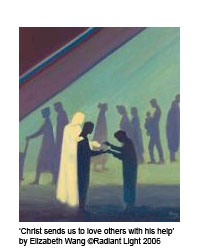Marriage
Marriages and convalidation of civil marriages are arranged by appointment with Fr. Alf. It is the policy of the Bishops' Conference of England & Wales that at least six months' notice be given, but it is quite usual for couples to see the priest one year before they plan to marry. Marriages are conducted for parishioners or for those who attend our parish regularly.
What does the Church teach?
Marriage is the most intimate and the deepest way that a human being can give himself or herself to another. Marriage has three key characteristics that mark it as a unique form of friendship. It is exclusive of all others (1), giving first place at all times to the one that each has chosen. It is faithful (2) in that it admits of no condition on either side: marriage is a pre-emptive strike of love that states "I love and will continue to love you beyond any others. I do this not because I stand to gain by it, or only for as long as you behave as I lay down. I do this because I make this choice to love you." And finally it has the potential to be fruitful (3): marriage brings a deeper and richer experience of living to those involved as joy shared is multiplied and sorrow shared is bearable, and, where this is possible, marriage is life-giving in its most dramatic sense as the love of husband and wife takes flesh in the form of their children. These three characteristics are peculiar to marriage, especially in that they are reinforced by oath: in marriage, the two parties do not enter an agreement or make a conditional contract - they swear an oath to the other. Remember; that the Latin word sacramentum literally means oath: they are sacred oaths by which God promises to be faithful to the covenant he makes with us - in marriage, the oath is sworn also by both husband and wife.
No other form of human relationship comes close to this degree of mutual commitment, even the deepest and longest-standing friendship. It is for this reason that the Jews, and following them, the earliest Christians came to regard the relationship between God and man as a form of marriage bond. The Church today continues to teach, in direct line with the teachings of Sacred Scripture and the writings of the Fathers of the Church, that the wedding commitment of husband and wife directly images the depth of self-giving which God offers to His people. Human marriage, we believe, is the divinely constructed scaled-down working-model of God's marriage with us. This marriage is not complete yet - indeed, as we shall see, it is only fully entered into in the Kingdom of Heaven.
For this reason, the Church is not content with saying that marriage is good, or that it is healthy, or even that it is psychologically necessary: marriage is all of these things, but in addition it is infinitely richer - marriage is sacred because it speaks not just about our need for human intimacy but about God and His relationship with us. So strongly does this thought run throughout the Sacred Scriptures and the constant thinking of the Church community that in time it came to be realised that marriage was not just designed by God and planted deep with human nature, but that each marriage is actively sustained by God, and particularly in a marriage between two Christians, regardless of the denomination, is explicitly used by him to demonstrate the raging fire of his love for us. We call this a Sacrament. No other religion has given such a dignity to human marriage, and no other Christian denomination has, from its foundation seen marriage in such an exalted light. Indeed, the Catholic Church is the only Christian body to teach in its most solemn official statements that marriage is a Sacrament - at the Reformation this was explicitly rejected by all the reforming parties because it was not explicitly stated to be a Sacrament in the Scriptures. In contrast, the Catholic Church holds up marriage as a sacred demonstration of the faithfulness of God's unconditional love for his people.
"The vocation to marriage is written in the very nature of man and woman as they came from the hand of the Creator. Marriage is not a purely human institution despite the many variations it may have undergone through the centuries in different cultures, social structures, and spiritual attitudes." (C.C.C. 1603)